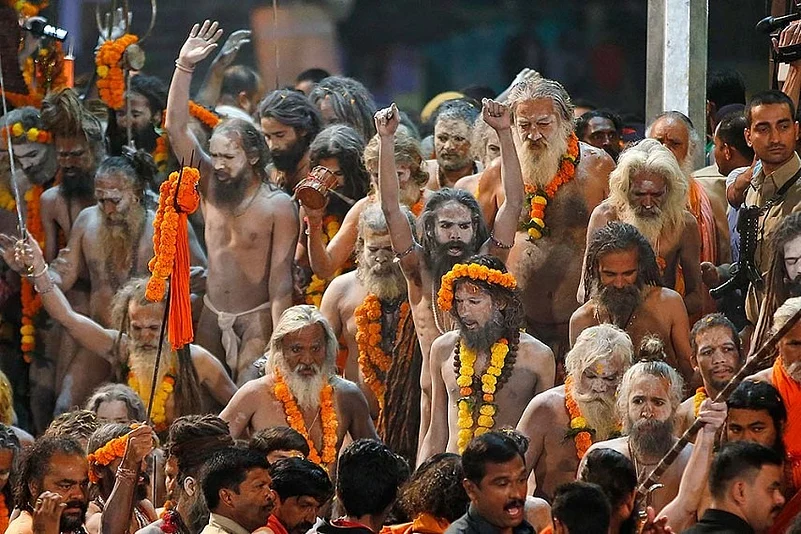The Indian government on Tuesday withdrew the subsidy to Hajj pilgrims in accordance to a 2012 Supreme Court order that asked to phase out the scheme in a time period of ten years.
The government move to divert the subsidy money to the welfare of the minority community is welcomed by the Muslim bodies who considered the money allocated for the purpose "Unislamic".
"This is part of our policy to empower minorities with dignity and without appeasement," Minority Affairs Minister Mukhtar Abbas Naqvi said while making the announcement.
The Islamic pilgrimage, according to the religious belief, is mandatory only to the people who can afford it from their own earnings.
Pilgrimage Subsidy Vs Constitution
Due to various concerns--regarding pilgrim safety, basic amenities-- the government has been providing monetory assistance to various pilgrims. Very recently, the Delhi government proposed that a total of 77,000 pilgrims will be able to avail the facility every year under the Mukhyamantri Tirth Yatra Yojana.
The BJP-ruled Madhya Pradesh government subsidises various pilgrimages for senior citizens and their attendants under the same scheme. MP is the only state that subsidises travel to holy places in Pakistan (Nankana Saheb Shrine and Hinglaj Mata temple), China (Kailash Man Sarovar), Cambodia (Angkor Vat) and Sri Lanka (Sita Mandir and Ashok Vatika).
Apart from Delhi, several other states like Chhattisgarh, Gujarat, Karnataka, Madhya Pradesh and Uttarakhand provide money to residents going on the Manasarovar yatra to cover a part of the expenses, which amount to about Rs 1.5 lakh each.
However, all these schemes, in a way, contravene with Article 27 of the Constitution that states: "Freedom as to payment of taxes for promotion of any particular religion No person shall be compelled to pay any taxes, the proceeds of which are specifically appropriated in payment of expenses for the promotion or maintenance of any particular religion or religions denomination."
The SC in 2012 had directed the Centre to gradually abolish the Haj subsidy over a period of 10 years. The apex court also said the Centre should invest that amount in education and other development measures for the minority community. It said that this subsidy is not only unconstitutional but inconsistent with the teachings of Quran.
The All India Majlis-e-Ittehadul Muslimeen (AIMIM) president Asaduddin Owaisi had also opposed the money for subsidy saying "it would be better spent on the education of Muslim girls".
According to official figures, the government has spent Rs 691 crore as Haj subsidy for 2013-14 and Rs 836 crore in 2012-13. In 2017, Haj subsidy was reduced by Rs 200 crore, from Rs 408 crore in 2016.
Other Pilgrimages
At present, the Union government spends crores of rupees as subsidies directly or indirectly for pilgrims of different beliefs visiting various religious shrines. The major pilgrimage destinations receiving assistance from the Centre include the Kailash Mansarovar Yatra and the Haj pilgrimage to Mecca and Medina. The Haj trip gets the largest chunk of the subsidy.
While the Kailash Mansarovar Yatra is currently organised under a bilateral arrangement with the Chinese government, the Indian government pays around Rs 6,000 towards boarding and accommodation of each pilgrim. The yatra is organised by the government, which spends money on security and health facilities for the pilgrims.
The Hindu megafest Kumbh, however, remains at the top of the spending list. Organised at four places in Haridwar, allahabad, Nashik and Ujjain, Kumbh-- which is also prone to many accidents-- receives maximum fund for preparations.
In 2016, the event got a massive boost from the central government. The Union Culture ministry set aside Rs 100 crore for the Simhastha Mahakumbh in Ujjain on top of state government's allocated Rs 3,400 crore.
Yogi Adityanath led government in Uttar Pradesh last year announced that it will spend a massive fund of Rs 2500 crore for the preparations of Ardh Kumbh mela shceduled to be held in 2019.
















